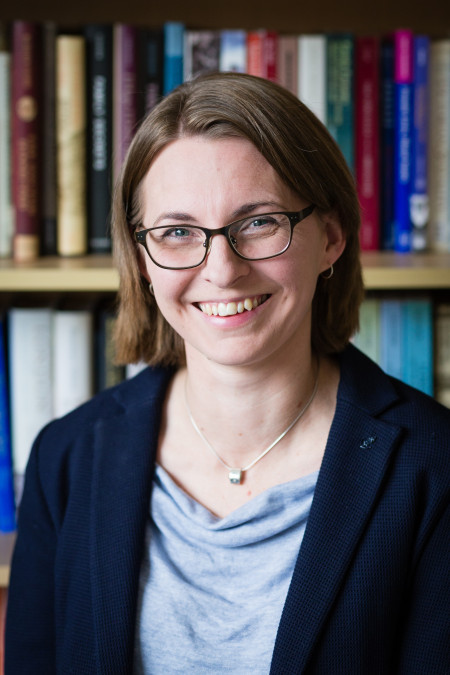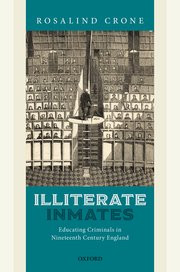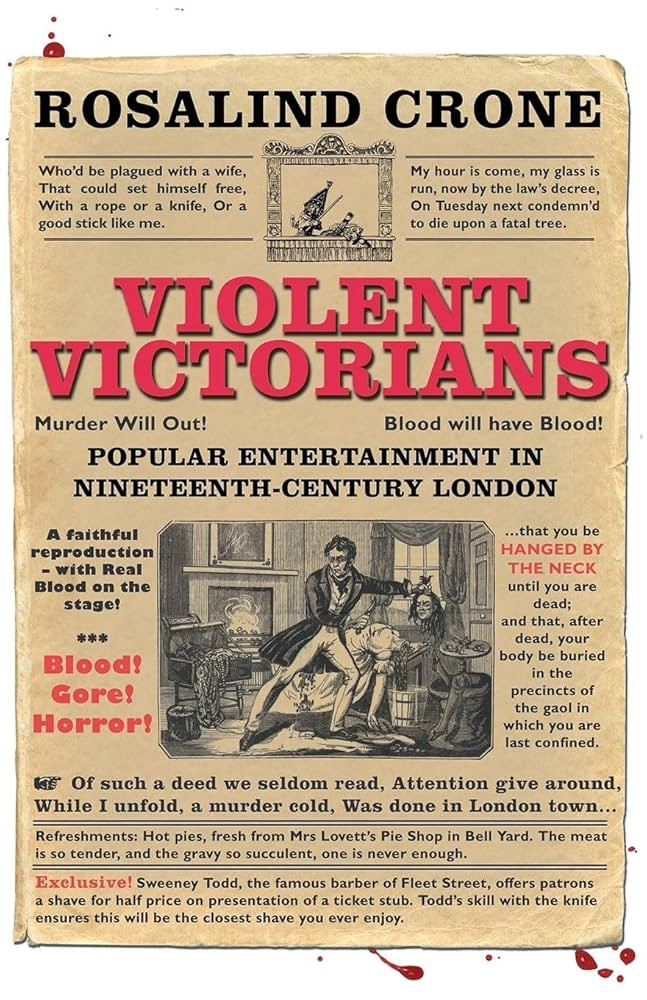
Prf Rosalind Crone
Head Of History
Biography
Professional biography
I joined the History Department at the Open University in 2009. Previously, between 2006 and 2009, I was based in the neighbouring English Department as a research fellow on an AHRC-funded project, The Reading Experience Database (1450-1945). I completed my BA (Hons) at the University of Queensland in Australia, and was awarded an MPhil and PhD in history from St John’s College, University of Cambridge.
At the Open University, I am a member of the Centre for the History of Crime, Policing and Justice, and the History of Books and Reading Research Collaboration. I am also an affiliated member of the Harm and Evidence Research Collaborative in the Faculty of Arts and Social Sciences and I remain a member of the project team for the Reading Experience Database.
Outside of the OU, I am a fellow of the Royal Historical Society. Together with Prof Steven King at Nottingham Trent University, I am editor of a monograph series published by McGill-Queen's University Press: States, People and the History of Social Change. I am also on the editorial board for The Historian, journal of the Historical Association.
Research interests
Broadly speaking, my research interests lie in a 'long' nineteenth century, c1780-c1914. More specifically, I am interested in the society and culture of nineteenth-century Britain, and particularly themes such as criminal justice, popular culture, education and reading practices.
I welcome PhD proposals on these themes but also on other social and cultural topics in the period of the nineteenth century. Recent and current PhD students have worked on a range of projects including policing in nineteenth-century Leeds, representations of crime in the late nineteenth and early twentieth-century press, unreasonable marital behaviours in Victorian Glasgow, sexual violence by men towards men, and pupil rebellions in public schools between the late eighteenth and mid nineteenth centuries.
At present, I am completing research in three areas:
Prison History

For the last 10+ years, I have been working on the history of prisons in Britain. Work began with an interest in reading in prisons which quickly expanded into research on prisoner literacy, prison schools, the (complicated) 19th century prison system, prison reform, and most recently, labour or work in prisons.
I have completed a number of articles on the literacy rates of prisoners. In April 2012, I was awarded a small grant from the Marc Fitch Fund to use surviving prison records from Suffolk to map the educational experiences of the poor in that county for the seventy years or so prior to the 1870 Education Act. This research was published as an article in Social History in 2018 (and you can read a blog post about the article here).
In March 2014, I was awarded an AHRC Early Career Fellowship to complete the research for my book on nineteenth-century prison education. Illiterate Inmates: Educating Criminals in Nineteenth-Century England was published by Oxford University Press in May 2022 (for more details, follow this link). In 2023, Illiterate Inmates was awarded the Anne Bloomfield Prize for the best book written in English on the history of education, awarded by the History of Education Society. The book also received an honourable mention for the British Association of Victorian Studies Rosemary Mitchell Prize.
In 2018 I launched a new resource, Prison History, which makes datasets originally arising from my research on the nineteenth-century prison freely available to other scholars and members of the public in order to expand our understanding of the use and experience of imprisonment in the past. Prison History currently hosts 19th Century Prisons, a database of 846 convict and local prisons operational in England between 1800-99, and Local Lock-Ups, a database of more than 900 structures used for the temporary confinement of accused criminals (and riff raff) by local communities between c.1500 and the 20th century. Prison History has featured in the genealogical magazine, Who Do You Think You Are, including as one of the 'Websites to Watch in 2020'.
In August 2019, I was awarded an AHRC Follow on Funding grant to work in partnership with Prisoners' Education Trust and former prisoners to transform the research completed for my monograph, Illiterate Inmates, into a free, Badged Open Course on the history of prison education in the UK. The course will be available to students in secure environments, to prison staff and those working in the criminal justice sector, and to anyone with an interest in the history of prisons in early 2022 on The OU's free learning platform, Open Learn.
Violent Entertainments

In 2012, I completed a monograph derived from my doctoral research on violent entertainments: Violent Victorians: Popular Entertainment in Nineteenth-Century London (Manchester University Press). This book is the first full-length study to address the wide range of gruesome, bloody and confronting amusements and pastimes, patronised by large numbers of ordinary Londoners, that did not conform to the values of respectability and restraint which we so often claim characterised Victorian culture. While pastimes involving displays of actual violence were brought under control during the early-nineteenth century, graphic, yet orderly, ‘re-enactments’ of high-level violence flourished in street or travelling entertainments, penny broadsides, popular theatres, cheap instalment fiction and Sunday newspapers. By examining these predominantly new amusements in detail, this book explores the ways in which gruesome, bloodthirsty and violent representations provided an outlet, indeed siphoned off, much of the actual violence that had hitherto been expressed in all manner of social and political dealings, thus providing a crucial accompaniment to schemes for the reformation of manners and the taming of the streets, while providing a mechanism through which the common people could ‘protest’ against the values of the establishment.
Click here to find out more about Violent Victorians.
More recently, I combined my interests in popular entertainment and policing to produce a collection of documents for the Pickering & Chatto series, The Making of the Modern Police, edited by my colleague in the history department, Paul Lawrence. My volume, Policing Entertainment (volume 4) was published in autumn 2014. The 6 volume collection has since been reviewed by the Times Literary Supplement (13 March 2015).
International Histories of Reading
Between March 2010 and February 2011, I was a Co-I on the AHRC project, ‘Developing an International Digital Network in the History of Reading’ with colleagues in the English department – W.R. Owens and Shafquat Towheed. During this period, the Reading Experience Database (RED) was subjected to major redevelopment: the UK RED website was enhanced, by adding new teaching tools and improving its functionality, in preparation for distribution to colleagues in Australia (Griffith University, Brisbane), Canada (Dalhousie University, Halifax), the Netherlands (Universiteit Utrecht) and New Zealand (Victoria University of Wellington) to allow the creation of other national REDs; and work began on a new international portal housed on the Open University web space to allow simultaneous searching of national REDs in particular fields. For more information, see the RED website.
Teaching interests
Since joining the department I have contributed to a number of teaching modules. Between 2010 and 2013 I was chair of AA312 Total War and Social Change: Europe, 1914-1955 and also of its associated residential school. I wrote several units for its successor module, A327 Europe 1914-1989: War, Peace, Modernity, and in 2012 and 2013 served as co-chair during its production. From 2009-2019 I was a member of the module team for A825/6 MA History and between 2019 and 2022 I chaired the production of its replacement, A883/4 MA History. I am currently module team chair for A883/4 MA History.
Impact and engagement
Broadcast Media
I have been interviewed or served as a consultant for a number of television and radio programmes related to my research interests, including on local radio stations (BBC Somerset, BBC Bristol, etc), The Long View (BBC Radio 4, 2024), Killing Victoria (BBC Sounds, 2023), Who Do You Think You Are Australia (Warner Bros/SBS Australia, May 2023), Expert Witness (BBC 1, December 2023), Patented: History of Inventions - on the penal treadmill (History Hit, 2022), Jay Blades: No Place Like Home (Hungry Bear/Channel 5, May 2022), The Forum (BBC World Service, October 2020) Who Do You Think You Are (Wall to Wall/ BBC One, August 2019), Classified Britain (Radio 4/ Loftus Media, May 2018), Inside... The Old Bailey (Channel 5, 2017), A Very British Murder (BBC4, September 2013), Food: A Scandalous History (Radio 4/ Just Radio, May 2013).
In 2024, I was historical consultant for a major Channel 4 series on the history of prisons presented by Rob Rinder - Britain Behind Bars: A Secret History. I also appeared in episode 3 on short term imprisonment. In 2025, I was historical constultant for Lucy Worsley Investigates - Jack the Ripper.
I have been interviewed for the popular BBC History Extra podcast series, Everything You Wanted to Know, on British Prisons (June 2021, available here) and Victorian Schools (November 2024, available here). I have also helped the BBC History Extra team to develop a new series, History's Greatest Scandals, and wrote the scripts/ co-presented the first five episodes on scandals in the Victorian age - released in January 2025 (available here).
Since 2021, I have been historical consultant (and resident historian!) for the award-winning BBC Radio 4 series, Lady Killers with Lucy Worsley, which looks killing (and living) by women in 19th century Britain, North America and Australia. All 3 series (30 episodes) are freely available on BBC Sounds (or wherever you get your podcasts). Follow these links for episode guides for series 1 and series 2. The third series was a BBC-Open University co-production. Behind the scenes interviews and bonus interactive content on the process of investigating the past is available on the BBC-OU Connect website. In 2024, the Lady Killers team released a new series, Lady Swindlers with Lucy Worsley, two series of which are now available on BBC Sounds and other podcast streaming platforms.
A full list of my academic publications can be found by clicking on the 'Publications' tab above.
I also regularly write for publications aimed at wider audiences, including BBC History Magazine. I am a member of the editorial board for The Historian, the magazine of the Historical Association, and regularly co-edit issues (including on the environment and crime and punishment).
Recent publications include:
'Victorian Britain's fearless female felons', BBC History Magazine, June 2025.
'Queens of the Underworld: Six female criminals who scandalised society’, BBC History Magazine, November 2024.
‘Scandalous Victorians! Eight shocking cases that transformed 19th century Britain’, BBC History Magazine, May 2024.
'Victorian Murder Scandals: What six killings tell us about women's lives in the 19th century', BBC History Magazine, January 2024, pp. 57-63
'Reading, Writing and Retribution’, BBC History Magazine, December 2023, pp. 41-45.
'Boris Becker's prison revelations and the role of celebrities in prison reform', History & Policy, April 2023, Read this online
'Victorian Lady Killers: Five Women Whose Crimes Shocked Society', BBC History Magazine, April 2023, pp. 46-51 Read this online
'Stuck in the Victorian past', Inside Times, 22 September 2022. Read this online.
'Focus on: Prison Records', Who Do You Think You Are Magazine, November 2021, pp. 63-67.
'Dickens: Social Crusader', BBC History Magazine, July 2020, pp. 54-59.
'Record Masterclass: Prison Registers', Who Do You Think You Are Magazine, September 2019, pp. 54-56.
'Silence and Separation', Who Do You Think You Are Magazine, Summer 2019, pp. 70-74.
Guide to the Criminal Prisons of 19th Century England (e-book, 2018). Download here.
'Educating Criminals; or, Where did the 19th-century prisoner go to school?', Social History Blog, April 2018. Read this online.
'Elizabeth Fry: The Great Reformer', BBC History Magazine, May 2017, pp. 44-47. Read this online.
'The People on the Notes: Elizabeth Fry', OpenLearn, February 2017. Read this online.
'Think entertainment is violent today? The Victorians were much, much worse', The Conversation, 13 October 2016 Read this online.
'Great Expectations: The role of education in penal reform', History & Policy, 27 May 2016. Read this online.
'Was Victorian life really so grim?', BBC History Magazine, Christmas 2015, pp. 50-56. Read this online.
'Jack the Ripper, a women's history museum and London's fascination with all things gory', The Conversation, 31 July 2015 Read this online.
'New evidence points to old Jack the Ripper suspect - but here is why I'm not convinced', The Conversation, 10 Sept 2014 Read this online.
‘ “Life after death”: Legacies of executed criminals in the nineteenth century’, Curator’s Choice: Selections from the John Johnson Collection of Printed Ephemera (2011) Read this online.
‘Reading (in) the Past, 1450-1945’, English Review (Oct 2009), pp. 24-26.
‘Crime reporting in the nineteenth-century newspaper’, British Library 19th Century Newspapers (British Library, 2009).
‘The Common Reader’, History Today (January 2008), pp. 42-43.
Projects
History Of The Prison Module [Prison History for New Learners Inside and Outside the Prison]
The last five years have seen the emergence of a number of new schemes to bring higher education into prisons. Programmes such as 'Inside Out' and 'Learn Together' are based on a philosophy of co-teaching enrolled university students alongside prisoners. In 2017, Prisoners' Education Trust formed the PUPiL (Prison University Partnerships in Learning) network in order to support and develop these initiatives. Within the PUPiL network there is no history module being offered at present. This is in spite of the significant interest among prisoners in history. The value of history as a tool for citizenship development, especially re-engagement and re-enfranchisement of individuals and communities. Furthermore, the large number of courses being offered in criminology, sociology, social policy and law, shows the further interest of prisoners in subjects that touch on their own experiences. This project - in collaboration with PET and drawing on the experience of the OU in the creation of high quality teaching materials - to develop a new module on the history of the prison which would be packaged in such a way that it could be taught by current PUPiL partners. The module will have a special focus on the history of prison education, again because this draws on prisoners' own experiences, but also as a way to celebrate the joint anniversaries of the OU (50) and PET (30) in 2019. Within the package of materials provided to PUPiL partners will be a range of information boards and high quality copies of archival documents and artefacts to enable students to curate an exhibition on the history of prison education for their end of course assessment.
Publications
Book
Illiterate Inmates: Educating Criminals in Nineteenth-Century England (2022)
Guide to the Criminal Prisons of Nineteenth-Century England (2018)
Violent Victorians: Popular entertainment in nineteenth-century London (2012)
The History of Reading, Volume 3: Methods, Strategies, Tactics (2011)
Book Chapter
Query: Victorian reading (2015)
Publishing courtroom drama for the masses, 1820-1855 (2012)
The mediation of response: a critical approach to individual and group reading practices (2011)
Journal Article
The Rise and Fall of the Prison Schoolmaster and Schoolmistress in 19th Century England (2025)
Educating the labouring poor in nineteenth-century Suffolk (2018)
Popular education in the British Isles during the nineteenth century (2017)
From Sawney Beane to Sweeney Todd: Murder machines in the mid-nineteenth century metropolis (2010)
Reappraising Victorian literacy through prison records (2010)
Crime–and its fabrication: A review of new digital resources in the history of crime (2009)